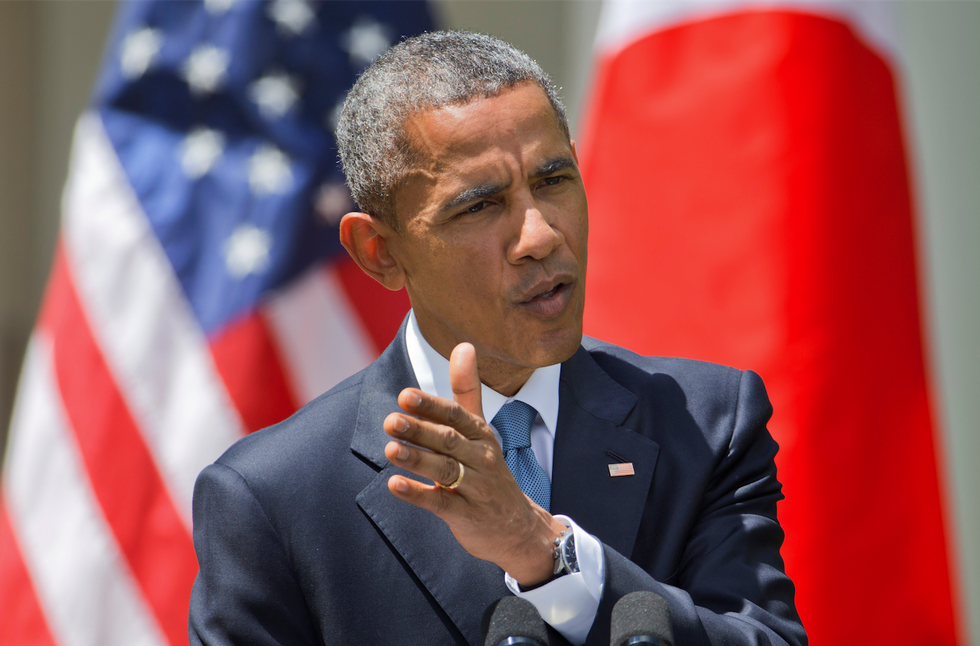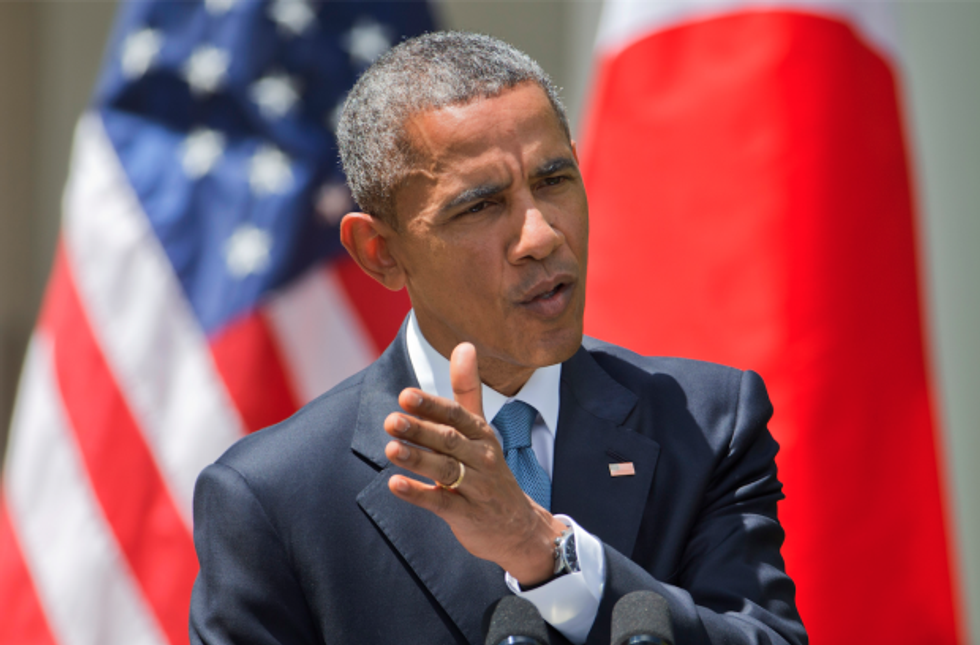
President Barack Obama speaks during a joint news conference with Japanese Prime Minister Shinzo Abe, Tuesday, April 28, 2015, in the Rose Garden of the White House in Washington. (AP Photo/Jacquelyn Martin)

There is speculation that President Obama may visit Hiroshima, Japan. Given the historical significance of the city as the first to be destroyed with an atomic weapon, dropped by the United States, it is probably appropriate. After all, presidents often visit Tokyo, which was, in fact, the scene of the most destructive bombing raid in history.
The key to any visit is symbolism and purpose. Would it be to call attention to the dangers of nuclear proliferation, or offer an apology for the attack? The former is naive but acceptable. The latter would be a travesty.
At the end of their recent two-day meeting in Hiroshima, G-7 foreign ministers adopted a statement that includes this line in English: “Hiroshima and Nagasaki experienced immense devastation and human suffering as a consequence of the atomic bombings.”

In the Japanese government translation, “human suffering” was rendered as hiningenteki na kunan which means “inhumane suffering,” or “humanitarian consequences." Either can be derived from the original Japanese.
“If you think about the gist of the Hiroshima Declaration, which shows the reality of the atomic bomb, the translation is appropriate,” Japan's Foreign Press Secretary Yasuhisa Kawamura said.
Well, certainly if any nation is expert at what rises to the level of “inhumane suffering,” it would be the architects of the Rape of Nanking, the Bataan Death March, the Sandakan Death March, The Sook-Ching Massacre, the Banka Island Massacre and the Manila Massacre, etc.
Hopefully the president, should he decide to visit Hiroshima, will remember Japan’s atrocities, for which they have never apologized, and consider that the Japan on the receiving end of "Little Boy" and "Fat Man" in 1945 was in no way the peaceful nation it is today.
I say this not to reopen wounds long healed, but merely to offer that perspective matters when discussing the atomic bombings.
If Obama does feel compelled to visit the site of the first nuclear attack in history, perhaps this would be an appropriate speech to give:
“As President I have thought long and hard about Hiroshima and Nagasaki. After all, I work in the very office in which the decision to drop the bombs was made.
“We have an expression in our country that says ‘hind-sight is 20/20.’ Meaning that it is much easier to analyze events after time has passed and conclude in retrospect what might have been done differently. But it is rather more complicated and even presumptuous to second-guess commanders’ decisions in the fog of war. And the fact is that in August 1945, the United States was in its fourth year of a long and ever more savage and bloody World War. Over 400,000 Americans had already perished, and many more were returning home from Europe and the Pacific maimed and hobbled.
“The battle for the island of Okinawa - lasting from April through June of 1945 - had been the bloodiest contest yet, costing the United States over 50,000 casualties, including 12,000 dead. Roughly a quarter of a million Japanese military personnel and innocent civilians were killed. By the summer of 1945, 90 percent of Japan’s cities were in ruins, and over million of its homeland citizens dead, and yet the Japanese militarist leaders showed little inclination towards capitulation, even though Nazi Germany had already surrendered.
“It was estimated that the planned invasion of the Japanese home islands, scheduled for late 1945, could have cost as many as a million Allied lives and many millions more Japanese men, women and children. Entire generations would have been wiped out. You, me and many listening to this speech, may not have been here had our grandparents been condemned to such a slaughter.
“Faced with this grim prospect, President Truman was offered a way to avoid this mutual calamity. In the diabolical mathematics of war, it is sometimes necessary to sacrifice the lives of thousands to save millions. The Pacific War was by its very nature especially cruel and savage and getting more so. To prolong that war, rather than try whatever it took to end it as expeditiously as possible, would have been immoral.
“Today, comfortable in our living rooms and seven decades removed from the ravages of a world at war, we can debate whether or not there was another path to peace short of immolation two of Japan’s finest cities. In 2016, free from the emotions, the suffering, the gold stars on the windows, and with the records available to historians and archivists that detail the excruciating deliberations within the Japanese circles of power, it is tempting to question those decisions made in the summer of 1945.
“But these are questions best suited for historical round tables. The leaders of 1945 could only make policy based on what was directly in front of them. And what they saw was a battle for the Japanese homeland that analysts predicted would be bloodier than all of the Pacific War's previous engagements, from Pearl Harbor to Okinawa, combined.
Given the choice between invasion and using the nuclear weapons at my disposal, as president, with a sublime responsibility to do everything in my power to save not just American lives, but Japanese lives as well, I would have opted to use the atomic bombs.
“As the only nation to deploy nuclear weapons in battle, The United States certainly has something to reflect upon, but we have nothing to apologize for.”
In recent interview, Hidehiko Yuzaki, the governor of Hiroshima prefecture, offered: "We’re not expecting President Obama to apologize.”
John Kerry, the first Secretary of State to visit Hiroshima, has also said there will be no apology.
But this mindset hasn’t stopped the president, on his own whims, from issuing unilateral mea culpas for the United States in the past. Hopefully Obama will stick to the program this time.
Brad Schaeffer is an energy broker, columnist, historian and author of the World War II novel "Hummel's Cross" about a Luftwaffe flying ace who saves a family of Jews during the height of the air war over Europe. Drop him a note at: shafemans@yahoo.
–
TheBlaze contributor channel supports an open discourse on a range of views. The opinions expressed in this channel are solely those of each individual author.